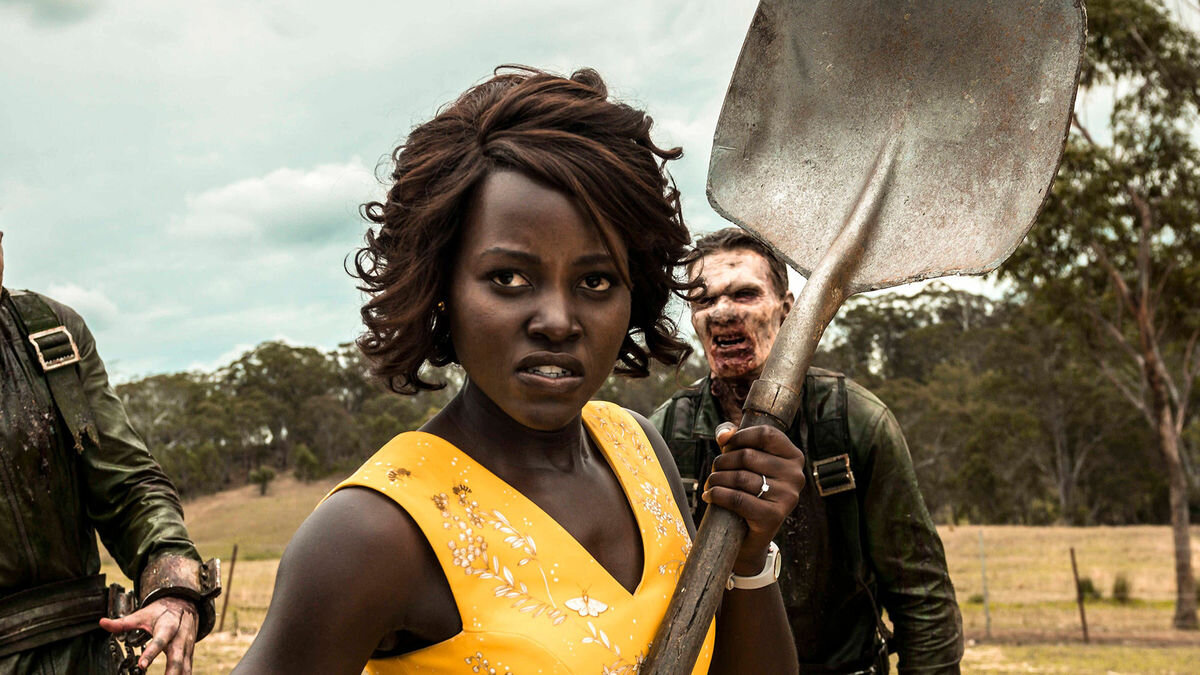[Pride 2021] I Am Not a Zombie
I am not a zombie.
For as enduringly progressive as the genre’s Romero origins are—a sensational and searing indictment of an inequitable, oppressive America—in the decades since, it has transformed into a siphon for antiquated ideals of masculinity and unbridled, conservative survivorship. Queerness and otherness are incompatible, even in a world swarming with the undead. Early on, I was drawn, almost attracted, to this ostensibly pious slice of how the world used to be. I paradoxically wanted men who were hypermasculine, gainful beacons of frontier virtue, while simultaneously rejecting the spaces where they lived and the land they worked.
The undead subgenre was a new American ideal of the homeland; nothing more than the contemporary frontier where patriotism, grit, masculinity, and guns were the raison d'être…whether the zombies were there or not.
In the contemporary landscape, Zack Snyder’s Dawn of the Dead, his recently released Army of the Dead, and even the enduringly popular The Walking Dead relegate otherness to the periphery. The men are hard and lean; survivors with guns and brawn. The women are often reduced to the same archetypes, nearly indistinguishable in action and attitude. Anything less than that warrants death, or that is what’s contended by the motivations of the contemporary undead. Conventionally feminine traits– forgiveness, tact, and ministration of the living– are denigrated. Those characters, the narratives contend, simply aren’t strong enough to survive.
It has been difficult, then, to fully immerse myself in one of horror’s most lucrative and popular subgenres. The land of the dead is hostile to me and my identity. More recent entries, however, have slowly and methodically endeavored to become more inclusive. The likes of Little Monsters and Train to Busan, while certainly not perfect– they, too, are steeped in hypermasculinity– are nonetheless veritably more progressive than their forebears, Romero’s output notwithstanding.
This dichotomy is compelling, especially when refracted through the lens of my own personal biases and lived experiences. There are times, especially living in the South, where I feel veritably undead. I shuffle through grocery stores and public spaces almost oppressively cognizant of my own sexuality. I feel slow, stiff, and brain dead on account of the cognitive effort it takes to process every step, every shift in tone, every bite of food I take or shirt I choose to buy. The perennial question of whether what I’m doing is too queer, and perhaps even worse, whether anyone has noticed.
It’s not entirely unfounded, either. In Downtown Orlando, “queer,” “gay,” or other epithets were the quotidian response to my mere existence. Tacos with friends or craft beer with coworkers– someone, often a drunk, but not always, had something to say. The behavioral and aesthetic components of the undead are clear– putrid, rotting flesh, a fetid wardrobe, bog mummies on land. Decay and death on two legs. Queerness was no different. There were cues and signals, and the paranoia often manifested in aversion. I am not welcome in those spaces. I was in danger in those spaces.
The genre remains hostile. Even Boyle’s 28 Days Later and its follow-up were so steeped in the hegemony of conventional masculinity and brawn that an audience might very well presume that death is congenital to queerness– in the zombie apocalypse, there are no queers left. Anna and the Apocalypse, a Buckingham bucco zombie musical, is confoundingly straight.
Yet, for as hostile as the subgenre is to me and my existence– how absolutely incompatible it is to who I fundamentally am– I remain a fan. I lament, but I watch them and enjoy them. Anna and the Apocalypse is a contemporary classic and, yes, I purchased the soundtrack. 28 Days Later is an exemplar of not just the modern zombie movie, but modern horror writ large. It is profoundly, staggeringly good.
The ideals, though, are often noxious. They genuinely feel like an assault at times, a filmic condemnation. Tact, grace, empathy, and emotion are death sentences. The sexual politics are unrestrained. Conventionally feminine ideals and values, the same ones the dominant culture uses to paint the gay community in broad strokes (they’re too sensitive!), are decried. I already feel unwelcome in the world of the living. Why would I want to feel unwelcome in the world of the dead?
I don’t know. I plan to watch Snyder’s Army of the Dead. I loved Peninsula. I watch Shaun of the Dead (arguably the most welcoming next to Romero’s canon) once a month. #Alive was the most profoundly human horror movie of 2020. There is hope, then, and like a virus, the subgenre is slowly and steadily infecting me. It started with a nibble and then a bite. One day, it will be a full transformation.


![[Pride 2021] I Am Not a Zombie](https://images.squarespace-cdn.com/content/v1/5b39608d75f9eef54c62c3f0/1622602651795-J24I74TC3M2FU771JIJH/210520-army-of-the-dead-netflix-jm-2017.jpg)



![[Pride 2021] Make Your Own Experiences: The Anxiety of Intimacy in Thelma](https://images.squarespace-cdn.com/content/v1/5b39608d75f9eef54c62c3f0/1624734133260-2ISA1VJXNJDHCPAS5OVW/thelma1.jpg)
![[Pride 2021] Heavenly Creatures & The Euphoria of Queer Friendships](https://images.squarespace-cdn.com/content/v1/5b39608d75f9eef54c62c3f0/1624733550877-3HFVE2WI19A955QUS0F7/12GUIDE2-superJumbo.jpg)
![[Pride 2021] Gender: Legend's Demonic Dancing Dress](https://images.squarespace-cdn.com/content/v1/5b39608d75f9eef54c62c3f0/1624731572551-EJRVDJHHENI6BL9MJ2X1/legend_1.jpg)
![[Pride 2021] In Defense of All Cheerleaders Die](https://images.squarespace-cdn.com/content/v1/5b39608d75f9eef54c62c3f0/1624224061135-VSLXGSER31EBM1RVMV9P/All+Cheerleaders+Die.png)
![[Pride 2021] Pinhead is My Husband, but Leatherface is My Child](https://images.squarespace-cdn.com/content/v1/5b39608d75f9eef54c62c3f0/1624731042334-GSDRTO6LVQ0A4V59AB6E/hellraiser-pinhead-is-daddy.jpg)
![[Pride 2021] The Triumph of a Queer Final Girl in Hostel: Part II](https://images.squarespace-cdn.com/content/v1/5b39608d75f9eef54c62c3f0/1624732413696-UPWYZ9LIAHTPIHBBQGNV/bloody-beth-and-stuart.jpg)
![[Pride 2021] Coming Out of the Fruit Cellar: The Queerness of 'Bates Motel'](https://images.squarespace-cdn.com/content/v1/5b39608d75f9eef54c62c3f0/1624729597742-ZXQMRPY0MQYZK18IXR8G/freddie+norma%281%29.jpeg)
![[Pride 2021] Queer Desire 'Behind Her Eyes'](https://images.squarespace-cdn.com/content/v1/5b39608d75f9eef54c62c3f0/1624728853155-F0FXFUEE17PSO2EJQUNJ/BEHIND-HER-EYES-ROB.jpg)
![[Pride 2021 Short Story] Dissonant](https://images.squarespace-cdn.com/content/v1/5b39608d75f9eef54c62c3f0/1624730348013-W9WGZCWYRQISNV5BOUG6/pexels-photo-45055.jpeg)
![[Pride 2021] Why Am I Different? Finding Myself in 'Crypt of the Vampire'](https://images.squarespace-cdn.com/content/v1/5b39608d75f9eef54c62c3f0/1624463550603-UBZK5RAXBBFXPF69L1WM/0+NWT6E4r3fvcY2D-N.jpg)
![[Pride 2021] Recognizing Queerness and Self in The Craft: Legacy (2020)](https://images.squarespace-cdn.com/content/v1/5b39608d75f9eef54c62c3f0/1622412857192-69ELG07OOS35GEH7CYVG/merlin_178952241_c61c5dc3-7504-4795-beba-450b42f36eb9-superJumbo.jpg)
![[Pride 2021] Identity in Dark Shadows Or How Gender Nonconformity Can Be Found Even in the Most Gothic of Soaps](https://images.squarespace-cdn.com/content/v1/5b39608d75f9eef54c62c3f0/1622412981551-5JM0TU1OCQZYP6EFUJU5/Nonbinary.jpg)
![[Pride 2021] Transmasculinity in Horror](https://images.squarespace-cdn.com/content/v1/5b39608d75f9eef54c62c3f0/1622929222182-IG42OIKXNMPAI996TE4D/strange+circus.jpg)
![[Pride 2021] Toxic Masculinity Killed the Zombie Genre](https://images.squarespace-cdn.com/content/v1/5b39608d75f9eef54c62c3f0/1623900387702-I9C8TLG3ZSXAGYQ09AHC/night-of-the-living-dead-ending.jpg)